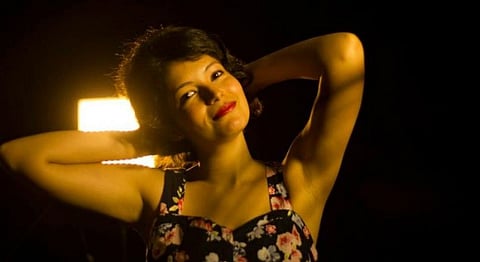
- HOMEGROWN WORLD
- #HGCREATORS
- #HGEXPLORE
- #HGVOICES
- #HGSHOP
- CAREERS
- ABOUT US
- CONTACT US

Millions of Indian women negotiate with their identities every day, picking through a myriad of able or disabled, fat or thin, beautiful or ugly. ACCSEX aims to dismantle the norms and conventions of what’s considered perfect and imperfect by tracing the lives of four differently abled Indian women and how they reclaimed their agency and sexual identities outside of their disability. The unapologetically confident women; Abha Khetarpal, Kanti Sagar, Natasha Taraporevala, and Sonali Jain share their stories of being differently abled in India and dissect their own sexual journeys.
In India, differently abled individuals are often treated as abnormal and denied access to a lot of spaces due to the lacking infrastructure. This idea of “abnormality” is the key focus of filmmaker Shreya Ghosh’s documentary, as she explores how differently abled women are often denied their sexuality by society. Each woman traced her own journey with her disability, and what made them emerge as stronger, confident people. Natasha Taraporevala, an illustrator, narrated a tale from her childhood where her professor assumed she was faking her deafness to seek attention and sympathy. In truth, she was able to understand words (through lip reading) sporadically, because the teacher would often cover her mouth with a book or turn around. She states that on a surface level, people find her attractive. When they find out she has a hearing impairment, they do not pursue her.
“Abnormal, for me, would be something out of the ordinary,” said Sonali Jain. “If I am disabled, there are lakhs of people who are disabled who can’t do the same things. How is that abnormal?” she adds. It’s these responses that propel discussion on what our ideas of the norm really is. Intersectionality is further explored in the stories of these women in the marriage market, where they came to realize very quickly that they were unlikely to get a match that did not have their exact disability on the notion that both people were now on equal footing.
The infantilisation of differently abled women and their bodies in pop culture was also explored. Abha Khetarpal points out the movie Barfi! as an example. Differently abled people are often depicted with childlike mannerisms and clothes in mainstream cinema; often treated as children rather than adults. This extends to the real world where Abha often felt that people would flock to her and treat her like a little child and hug her excessively, but ignore her sister who was 45. The idea of differently abled women not having agency to their bodies extends to places like beauty parlours, where Abha often felt questioned for even being there.
As of a recent census, there are 26,810,557 differently abled people in India -11,824,355 are women. The disability rights movement only began in the 1990s, but even with legislative changes, not much has changed in social spheres. Being a differently person in India has even more ramifications when you’re a woman; an ideal woman in India is marked by her ability to be a homemaker and follow a certain norm of domesticity that often excludes the differently abled. Because the government doesn’t provide enough facilities or access to disabled people, it often falls to family to make decisions. In a 106-page report, Human Rights Watch showcased how women were often treated worse than animals when they were unable to fulfill the expectations of their able-bodied counterparts, and were often forcibly institutionalized in arbitrary mental institutions and residential care facilities, often with overcrowded facilities that lacked hygiene and contained inadequate access to medical help. This lack of general awareness of differently abled people and the insistence on using dehumanizing markers is what ACCSEX poignantly identifies and turns around. Here are women who know exactly how valuable they are, and refuse to be acknowledged in any other way. Their insights into being women who define their own sexuality vastly mirror the struggles of women across the country, their ‘labels’ notwithstanding.
Feature Image: Natasha
Click here to watch the complete documentary.
